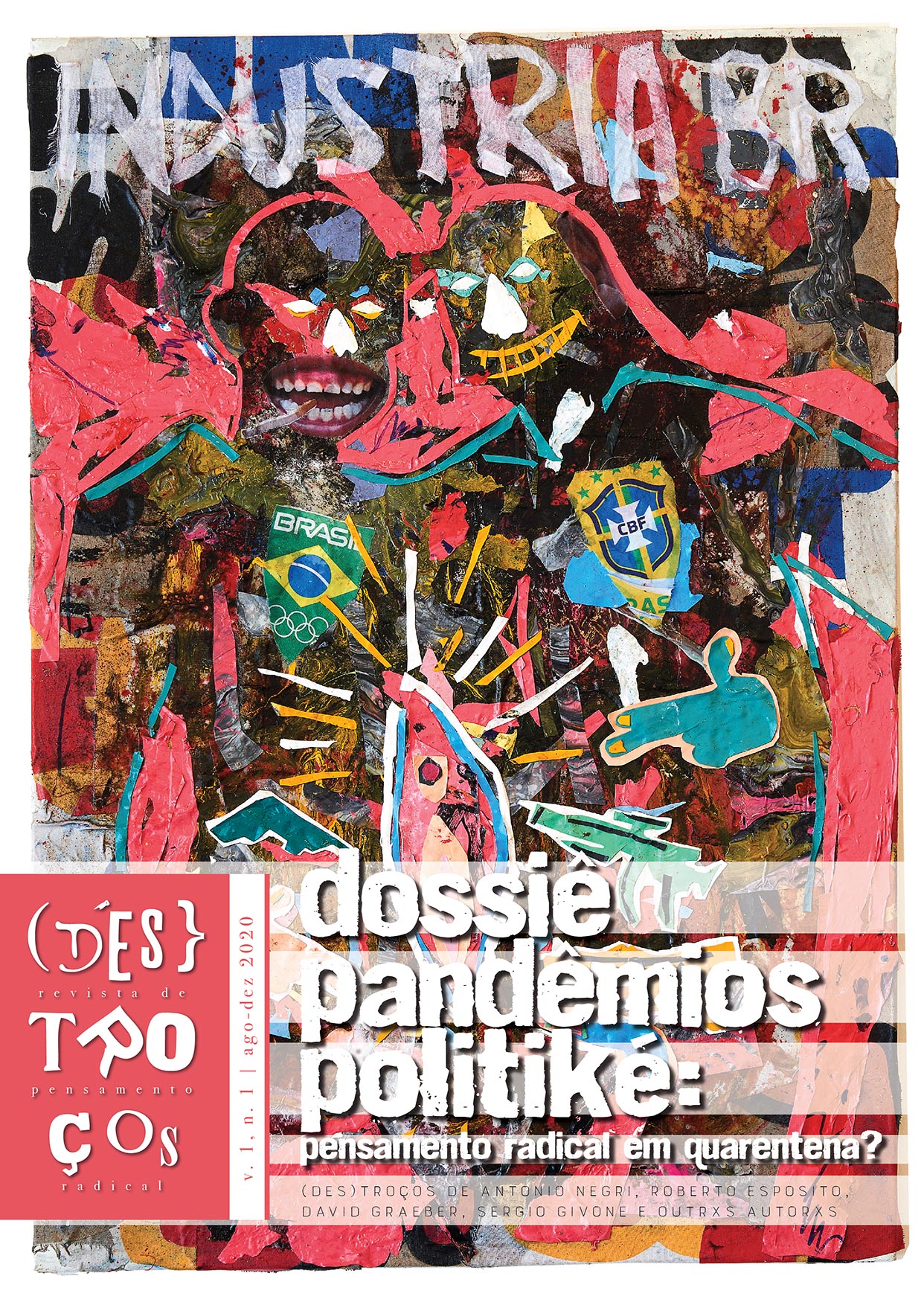Legitimating juridical and social practices of the liberal economic model of appropriation
Published 2021-01-25
Keywords
- juridical practices,
- subjectivation,
- appropriation,
- legitimation,
- neoliberalism
How to Cite
Copyright (c) 2021 (Des)troços: journal of radical thought

This work is licensed under a Creative Commons Attribution-NonCommercial 4.0 International License.
Abstract
This paper aims to analyze how global power structures’ social and juridical practices employed by the capitalist model legitimize an appropriation of production. In this instance, this reaserch focus on The origin of the family, private property and the State, by Engels, articulating it with texts that actualizes the problem: The birth of biopolitics, by Foucault, Circuito dos Afetos, by Safatle, and The new way of the world, by Dardot and Laval. This research examines a social class that, without producing, appropriates the production and, as the same time, subdues the producer economically and politically. At the end, we present some of the consequences of the establishment, creation and legitimization of the division of social classes, as an attempt to "legalize" an economic exploitation of others, naturalizing a social body, and, mainly, as social practices (state, discursive, moral and legal) of subjectivity employed in this process which results in the creation of neoliberalism.
Downloads
References
- ADVERSE, Helton. Liberdade e governamentalidade: Foucault e a genealogia do liberalismo. Revista Estudos Filosóficos, nº 12, 2014. Disponível em http://www.ufsj.edu.br/portal2-repositorio/File/revistaestudosfilosoficos/art2%20rev12.pdf. Acesso em 10 de agosto de 2014.
- ARENDT, Hannah. A dignidade da política. Trad. Helena Martins, Frida Coelho, Antonio Abranches, César Almeida, Claudia Drucker e Fernando Rodrigues. Organização, introdução e revisão técnica de Antonio Abranches. Rio de Janeiro: Editora Relume Dumará, 2002.
- BRÖCKLING, Ulrich, KRASMANN, Susanne, LEMKE, Thomas. Governmentality: current issues and future challenges. Nova Iorque: Routledge, 2011.
- BROWN, Wendy, Undoing the demos: neoliberalism’s stealth revolution. New York: Zone Books, 2017.
- CLASTRES, Pierre. A sociedade contra o estado. Trad. Theo Santiago. São Paulo: Ubu, 2017.
- DARDOT, Pierre; LAVAL, Christian. A nova razão do mundo: ensaio sobre a sociedade neoliberal. Trad. Mariana Echalar. São Paulo: Boitempo, 2016.
- DELEUZE, Gilles. Qu’est-ce qu’un dispositive? In: Michel Foucault philosophe: Rencontre Internationale, Paris 9, 10, II janvier 1988. Seuil/Gallimard, 1989.
- ENGELS, Friedrich. A origem da família, da propriedade privada e do estado. Trad. Leandro Konder. Rio de Janeiro: Editora Civilização Brasileira, 1984.
- ENGELS, Friedrich. Ludwig Feuerbach e o fim da filosofia clássica alemã. Trad. José Barata-Moura. In: ENGELS, Friedrich. Obras escolhidas. Moscou, 1982.
- FOUCAULT, Michel. Ditos e escritos VIII: Michel Foucault, segurança, penalidade e prisão. Org. Manoel Barros da Motta. Rio de Janeiro: Forense Universitária, 2012.
- FOUCAULT, Michel. Em defesa da sociedade. Trad. Maria Ermantina Galvão. São Paulo: Martins Fontes, 1999.
- FOUCAULT, Michel. O nascimento da biopolítica. Trad. Eduardo Brandão. São Paulo: Martins Fontes, 2008.
- FOUCAULT, Michel. Segurança, território e população. Trad. Eduardo Brandão. São Paulo: Martins Fontes, 2008b.
- LOWY, Michael. Walter Benjamin: aviso de incêndio – uma leitura das teses “Sobre o conceito de história”. Trad. Wanda Nogueira Caldeira Brant, Jeanne Marie Gagnebon e Marcos Lutz Muller. São Paulo: Boitempo, 2005.
- MATOS, Andityas Soares de Moura Costa. Filosofia radical e utopia: inapropriabilidade, an-arquia, a-nomia. Rio de Janeiro: Via Verita, 2014.
- MONOD, Jean-Claude. Foucault: la police des conduites. Paris: Éditions Muchalon, 1997.
- MORAIS, Ricardo Manoel de Oliveira. Normalização e processos de constituição da verdade. Revista de Estudos Constitucionais, Hermenêutica e Teoria do Direito (RECHTD), volume 7, número 2, pp. 197-209, 2015. Disponível em https://www.academia.edu/30734895/Normalização_e_processos_de_constituição_da_verdade_Normalization_and_processes_of_truth_constitution. Acesso em: 30 jun. 2017.
- MORAIS, Ricardo Manoel Oliveira; SILVA, Adriana Campos. O liberalismo econômico e as práticas de segurança: o “avesso” das democracias liberais. Revista da Faculdade de Direito UFPR, Curitiba, PR, Brasil, v. 62, n. 3, pp. 221-242, set./dez. 2017. Disponível em: http://revistas.ufpr.br/direito/article/view/53720. Acesso em: 21 mai. 2020.
- MORGAN, Lewis H. Ancient society. Chicago: Charles H. Kerr & Company, 1990.
- OPITZ, Sven. Govern unlimited: the security dispositif of iliberal governmentality. In: BRÖCKLING, Ulrich, KRASMANN, Susanne, LEMKE, Thomas. Governmentality: current issues and future challenges. Nova Iorque: Routledge, 2011.
- PIZZORNO, Alessandro. Foucault et la conception libérale de l’individu. In: Michel Foucault philosophe: Rencontre internationale, Paris 9, 10, II janvier 1988. Seuil/Gallimard, 1989.
- SAFATLE, Vladimir. Circuito dos afetos. São Paulo: Cosac Naify, 2015.

